While space exploration is all fine and dandy, and things like SpaceX’s recent rocket launch with people on board is a huge achievement worth celebrating, some people are reminding us that there is still a lot left to learn here on Earth.
Humanity has really only discovered 5% of our oceans, and there is a myriad of new species of animals evolving at a pace that is beyond human ability to keep up.
That is why scientists are busy studying everything that they can lay their hands on, including things as niche as pigeon facial recognition and its significance in finding mates. Yes, you read it correctly.
Leave it to the internet to take a serious scientific study and summarize it in a ridiculous, yet very true way
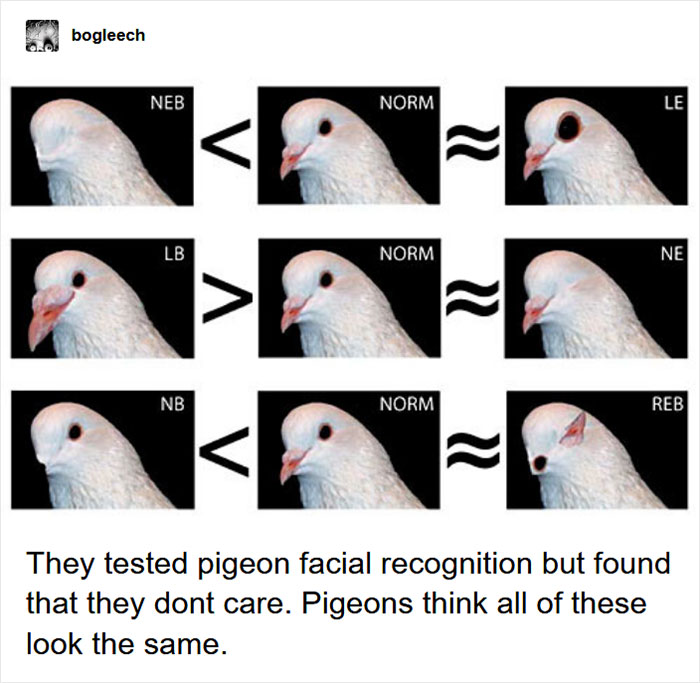
Image credits: homofocused
Tumblr user bogleech recently shared a picture of the different pigeon faces scientist used to test pigeon facial recognition abilities
A Tumblr user by the nickname of bogleech posted a picture from a scholarly article that reviewed the results of several studies examining the structure of bird visual cerebrum (a part of the brain) and the importance of visual abilities to bird social and mating behaviors.
The study in question is titled Avian Visual Behavior and the Organization of the Telencephalon composed by Toru Shimizu, Tadd B. Patton, and Scott A. Husband, which you can read here. The article reviews a handful of studies done on pigeons and other birds, focusing on one particular study that essentially examined how male pigeons react to female pigeons possessing different facial characteristics when it comes to picking out a mate.
The key conclusion to take from this is that pigeons have facial preferences when choosing a mate
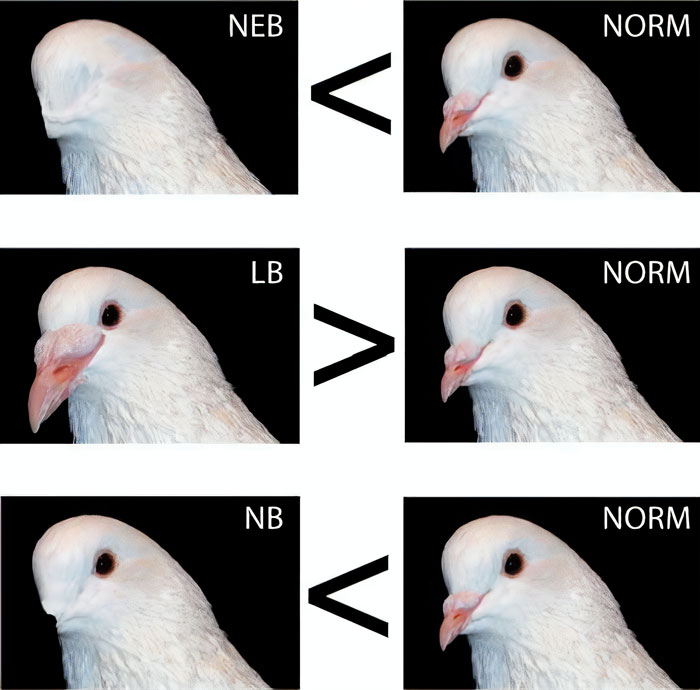
Image credits: Toru Shimizu, Tadd B. Patton, Scott A. Husband
You see, the study described an experiment where male pigeons were put into an enclosure and were shown living as well as photographic depictions of female pigeons. Each time a pigeon was shown, the male’s social communication was studied—things like bowing, tail-dragging, and vocalization. These were signs of him being sexually attracted. Now, the study identified that seeing the female pigeon’s face was a significant part of the male pigeon actually recognizing it as a pigeon, and determining whether he was sexually attracted or not.
So, scientists photoshopped several versions of female pigeon faces to see how that influenced the male’s attraction. They created versions of female pigeon faces which had large eyes, excluded beaks, and other variations, as well as, of course, a regular picture as a control. Then they displayed two images at a time to see which of them the male pigeons preferred, and the results were rather amusing.
However, there were some facial characteristics that the pigeons found as attractive as normal pigeon features
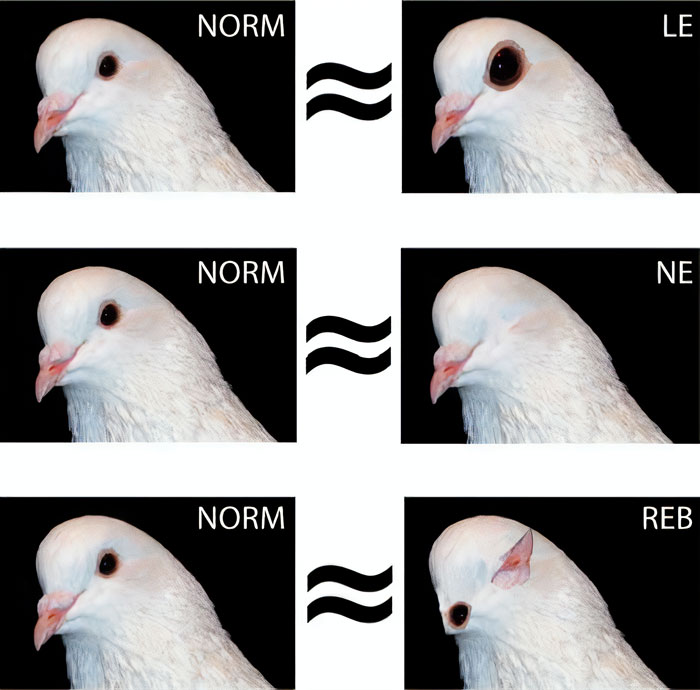
Image credits: Toru Shimizu, Tadd B. Patton, Scott A. Husband
And then the internet happened, with two Tumblr users pointing out the obvious which made it very funny

Image credits: homofocused
And who better than internauts to rephrase these conclusions to make them appeal to the masses? In response to the original Tumblr post—in very internet fashion—users dinkywinks and homofocused teamed up and came to an even better-phrased conclusion: it doesn’t matter how messed up the lady pigeon’s face is—the guy pigeon will still want to do “the dance.”
With due respect to science, Tumblr user homofocused explained the study from a slightly different perspective
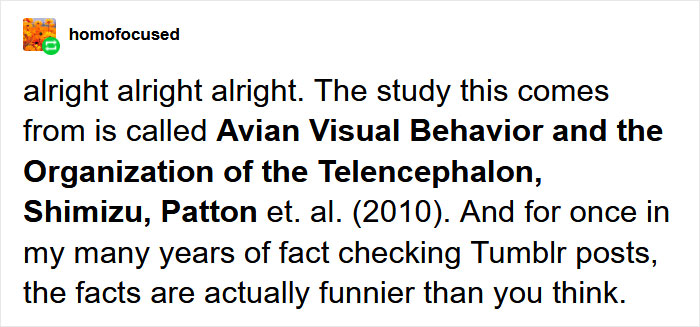

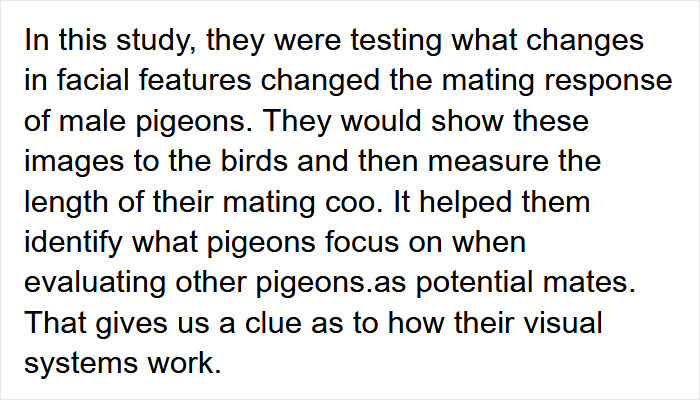


Image credits: homofocused
Turns out, males preferred (i.e. cooed in arousal longer) fully-intact female images compared to those that had either the eyes or the beak missing. Also, an exaggerated beak seemed to draw the attention of the male specimen more than an exaggerated eye. This was explained by pigeons likely viewing a larger beak as an advantage in their mates when it comes to feeding and preening behaviors.
Lastly, and most interestingly, male pigeons viewed female pigeons with the flipped faces—i.e. with an eye in place of a beak and a beak in place of an eye—as equally sexually attractive as with a normal control face. It’s important to note that, overall, pigeons were attracted to all kinds of faces, just that there were major preferences.
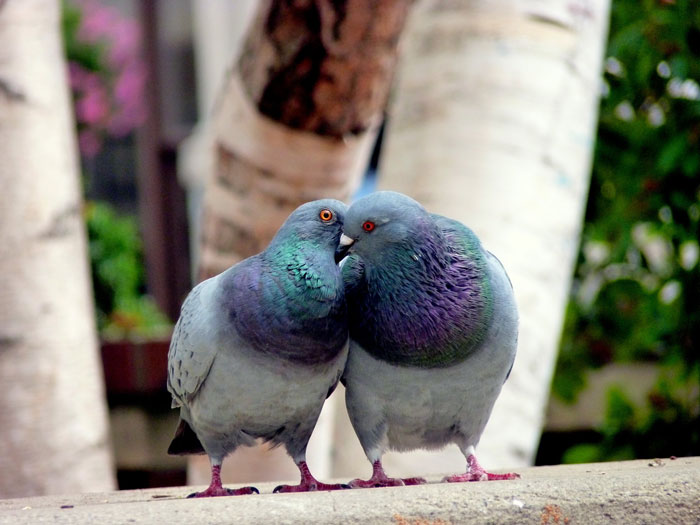
Image credits: .jocelyn. (not the actual photo)
Homofocused elaborated on this: “They didn’t just test to see if these pigeons recognized the images as other pigeons. They tested to see if they wanted to [mate with] it. In this study, they were testing what changes in facial features changed the mating response of male pigeons. They would show these images to the birds and then measure the length of their mating coo. It helped them identify what pigeons focus on when evaluating other pigeons as potential mates. That gives us a clue as to how their visual systems work.”
So, if you need a tl;dr version, here’s a spot-on one by the same user: “a male pigeon will see a lady pigeon with a beak where her eyes should be and think ‘I would like to [make love to] that.’” Science is awesome. The more you know, folks.
What are your thoughts on this? What are some other pigeon science and facts that you wish people knew more about? Let us know in the comments section below!



0 Yorumlar